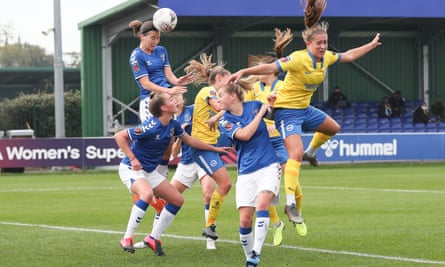Baroness Sue Campbell, the director of women’s football at the Football Association, has conceded there is no timeframe for the introduction of full-time professional referees in the women’s game between now and 2024.
The quality of refereeing in the Women’s Super League has been heavily criticised this season. On Sunday the Brighton forward Kayleigh Green was shown two yellow cards but the referee Lucy Oliver failed to issue a red, and the player remained on the pitch for the duration of the match despite protests from Everton.
Speaking at the launch of the FA’s new four-year strategy for women’s football on Monday, Campbell stressed that professionalism was something the head of refereeing, Jo Stimpson, was “passionate” about and that “ultimately that will be where we get to, but I don’t know what the timeframe is on that”.
Campbell said: “To be fair, Premier League referees are full-time and they still get just as much criticism. It’s just a tough job, isn’t it? Refereeing is a tough, tough gig.
“Our top eight Fifa-nominated women will not be going full-time, but certainly through our scholarship programme they will have significantly more time to focus on training and development than they’ve had in the past.”

There will be other improvements, too. As well as having every match filmed and observed, referees are being assigned a “core coach” to mentor them which will also help to identify those that do “want to go on and be full-time professional referees”.
In addition to improvements in refereeing, the new strategy has a further seven key objectives. They include ensuring every primary-school-aged girl has access to football, with Campbell confirming the FA operates in around 10,000 of England’s 23,000 schools, giving every girl equal access to playing football for fun or for excellenceand the building of an effective pathway through clubs.
Other objectives include building the domestic leagues into the best in the world, winning a major tournament at senior level, embedding local leaders to support football in their communities, and building and diversifying the pool of coaches by equalising access to playing at the lower reaches of the women’s game.
A separate strategy for the professional women’s game will be launched on 1 November and Campbell said the FA has “no long-term ambition to hang on to the league for the sake of hanging on to it” in response to increasing talk of a potential takeover or independence, but added that professionalism is still in its infancy and it has a duty of care.
“We’re all very committed at the FA to making sure that when [the WSL] does step away that we’ve done all the due diligence necessary to make sure this remains healthy and sustainable,” she said. “We don’t want this to be something that is here for a few years and then implodes or disappears.”
The aim of the new strategy is to build on the targets set out in the first, the Gameplan for Growth, launched in March 2017. That document targeted long-term success of the Lionesses, with winning at the 2021 home Euros and/or 2023 World Cup in Australia the aim. That ambition remains and Campbell gave an emphatic “yes” when asked if not winning either would be deemed a failure, adding that the long-awaited decision and announcement on who will lead Team GB at the Olympics will come in November.
from Football | The Guardian https://ift.tt/2FHqzZH
via IFTTT

No Comment